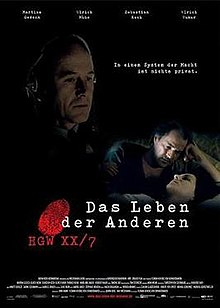| The Lives of Others | |
|---|---|
 Original German-language poster | |
| Directed by | Florian Henckel von Donnersmarck |
| Written by | Florian Henckel von Donnersmarck |
| Produced by |
|
| Starring | |
| Cinematography | Hagen Bogdanski |
| Edited by | Patricia Rommel |
| Music by |
|
Production companies |
|
| Distributed by | Buena Vista International |
Release date |
|
Running time | 137 minutes[1] |
| Country | Germany |
| Language | German |
| Budget | $2 million[2] |
| Box office | $77.3 million[2] |
The Lives of Others (German: Das Leben der Anderen, pronounced [das ˈleːbn deːɐ̯ ˈʔandəʁən] ) is a 2006 German drama film written and directed by Florian Henckel von Donnersmarck marking his feature film directorial debut. The plot is about the monitoring of East Berlin residents by agents of the Stasi, East Germany's secret police. It stars Ulrich Mühe as Stasi Captain Gerd Wiesler, Ulrich Tukur as his superior Anton Grubitz, Sebastian Koch as the playwright Georg Dreyman, and Martina Gedeck as Dreyman's lover, a prominent actress named Christa-Maria Sieland.
The film was released by Buena Vista International in Germany on 23 March 2006. At the same time, the screenplay was published by Suhrkamp Verlag. The Lives of Others won the Academy Award for Best International Feature Film. The film had earlier won seven Deutscher Filmpreis awards—including those for best film, best director, best screenplay, best actor, and best supporting actor—after setting a new record with 11 nominations. It also won the BAFTA Award for Best Film Not in the English Language and European Film Award for Best Film, while it was nominated for the Golden Globe Award for Best Foreign Language Film. The Lives of Others cost US$2 million[3] and grossed more than US$77 million worldwide.[2]
Released 17 years after the fall of the Berlin Wall, marking the end of the German Democratic Republic, it was the first notable drama film about the subject after a series of comedies such as Good Bye, Lenin! and Sonnenallee. This approach was widely applauded in Germany, and the film was complimented for its accurate tone despite some criticism that Wiesler's character was depicted unrealistically and with undue sympathy. The film's authenticity was considered praiseworthy given that the director grew up outside of East Germany and was 16 when the Berlin Wall fell.[4]
- ^ "DAS LEBEN DER ANDEREN - THE LIVES OF OTHERS". British Board of Film Classification. 27 November 2006. Retrieved 24 November 2012.
- ^ a b c "The Lives of Others (2007)". Box Office Mojo. Retrieved 7 July 2011.
- ^ Cite error: The named reference
arnytwas invoked but never defined (see the help page). - ^ Ash, Timothy (31 May 2007). "The Stasi on Our Minds". The New York Review of Books. 54 (9). Retrieved 17 November 2014.
It was therefore with particular interest that I recently sat down to watch The Lives of Others, this already celebrated film about the Stasi, made by a West German director who was just sixteen when the Berlin Wall came down.